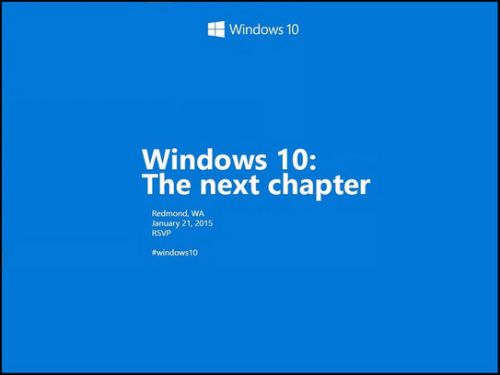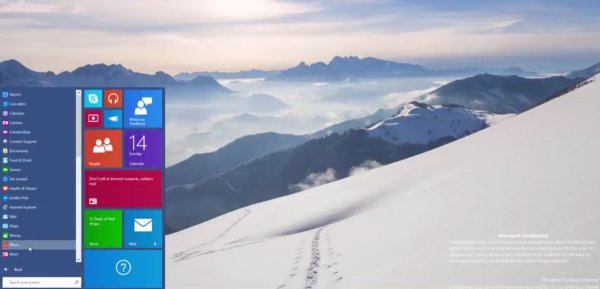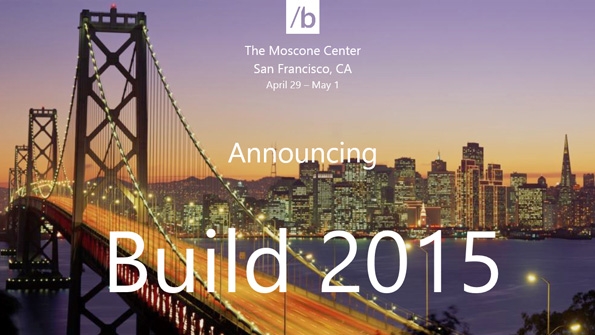Everything posted by allheart55 Cindy E
-
What do you guys think about wincleaner?
I hear that. :eek:
-
What do you guys think about wincleaner?
No problem, Mike. I guess you get questions like that all the time too, from your customers.
-
What do you guys think about wincleaner?
I've never used it or even heard of it, Mike. I did just check it out via your link and I would never use or even recommend this software. It is what they call an optimizer. It supposedly cleans and speeds up your computer and it comes complete with a registry cleaner. You are better off without it. None of these type of software programs actually make your computer run more efficiently or use less resources. They will eventually muck up your registry with continued use. Thumbs down!!
-
Joke Of The Day
- What To Expect (And What You Won't See) At This Week's Windows 10 Launch
This isn't just another Windows launch. Later this week, when Microsoft unveils the latest Windows 10 preview release at an all-day event in its Redmond headquarters, it will be following a well-worn playbook. But the expectations for this version are impossibly high, especially after the lukewarm (to put it kindly) reception for Windows 8. One of the biggest challenges for Windows is that it has to serve two wildly different customer bases. One is the conservative IT community, which wants centralized management capabilities for fleets of PCs running business applications. The other is a consumer market that has become conditioned to rapid change and is increasingly shifting its attention in recent years to mobile devices. The Windows 10 technical preview released last fall was aimed squarely at enterprise customers, bringing back the Start menu and allowing sandboxed Windows Store apps to run in windows instead of full screen. This week's update should be much more focused on consumer devices and services. Microsoft is taking its Advance Notification Service private, claiming the change is due to changes in the way users want their advance security notifications. The OEM story It's been a bumpy ride for Microsoft and its OEM partners over the past two years. Microsoft designed Windows 8 to bring mobile capabilities to traditional PC platforms and to enable a new range of form factors for Windows, especially tablets. It even introduced its own line of hardware, under the Surface brand, thereby directly competing with its OEM partners for the first time ever. If previous Windows launches are any guide, you can expect Microsoft to showcase new devices from its OEM partners at this week's event. I'll be watching closely both for new hardware features that will take advantage of Windows 10 (support for biometric identification like fingerprint readers, for example) as well as for signs of tension in those OEM relationships. Continuum There's a fundamental problem with hybrid devices like the Surface Pro and Lenovo's Yoga, which can shift quickly between two form factors, traditional PC and tablet. A user interface that works well with a keyboard and a mouse or track pad can be awkward to control using a touchscreen. Last fall, when Microsoft debuted the first Windows 10 Preview, the company said its solution would be a new interface design it calls Continuum, which dynamically changes interface elements as the hardware itself changes. At the time, it had only a vague conceptual video to share. This is probably the single most eagerly awaited feature in Windows 10. If it succeeds, then the entire premise of this Windows generation makes sense. If it fails... Cortana Cortana--or at least some of her DNA--is already in the early preview builds of Windows 10, but the feature isn't enabled yet. With this preview, Microsoft should flip the switch and add its personal assistant to the full breadth of Windows 10 devices. The big question is whether Cortana's capabilities are seen as a welcome addition to the PC platform or as a gimmick. Digital media The concept of the PC (or Mac) as digital media hub was a very big deal at the turn of the 21st Century. Today, it seems downright quaint. But there are still enthusiasts who use PCs to manage, share, and stream digital media collections, and smaller tablets based on Windows are ideal for watching movies and listening to music. Microsoft's clearly not abandoning those customers, given its decision to add support for two formats that are popular with enthusiasts: FLAC, for lossless audio, and MKV, a universal, open-source format used mostly for swapping movies and TV shows. Xbox services As Satya Nadella finishes his first full year as CEO, he's made it clear that the Xbox platform is a strategic part of Microsoft's Windows 10 strategy. The Xbox One, in fact, is basically a PC disguised as a game console. Windows 10 should bring PC-style devices and the latest Xbox closer together, but it's not yet clear that Microsoft has figured out how to take advantage of the synergies between the living room and the PC. Windows Phone The past year has been a rough one for Microsoft's mobile aspirations. The Nokia acquisition is closed, but Windows Phone is still stuck in the low single digits in terms of market share. One of the key drivers behind unifying the Windows code base on PCs and phones is to make it possible for developers to build universal apps that can run on both types of devices. Whether that will be enough to win over mobile developers is a key question. For better or worse, though, I think this week's announcements will show that Microsoft is still committed to its mobile platforms for at least another two years. Unfinished business: Internet Explorer and OneDrive The rumored "Spartan" browser is a key feature of Windows 10 that should debut in this preview. In addition, Microsoft is pinning a lot of expectations on the hooks between Windows 10 and its cloud services. Two of those services share a brand name: OneDrive is the consumer cloud storage service, and OneDrive for Business is the Office 365 equivalent for enterprise-customers. Microsoft says it's unifying those storage and sync services in 2015, with a roadmap that extends past the launch of Windows 10 later this year. The big question for this preview release is how rough the edges will be around both those eagerly awaited features. What you won't see this week With this week's event focusing on consumer features, you can expect to hear far less than usual about traditional enterprise topics. Windows 10 should include new tools for deploying and managing corporate devices. I don't expect to hear much about those enterprise features this week. Windows 10, like any major release, will include Server editions as well. If those editions are mentioned at all this week, it will be in passing. I also expect the Microsoft hardware teams to be mostly quiet. A Surface Pro 3 refresh with the latest Intel CPUs should be on deck soon, but this isn't a hardware event and I would expect that launch to get its own spotlight in another month or two. Likewise, Microsoft's Lumia hardware is a key piece of the Windows 10 puzzle. We might get a tease of a new device this week, but I would expect any formal product launches to wait for Mobile World Congress in early March. And of course, two details that likely won't be discussed at all this week are the release schedule and details of packaging and pricing. This week's preview release is a major milestone, but there are still months of work ahead before Windows 10 is ready to ship. http://www.zdnet.com/article/what-to-expect-at-the-january-2015-windows-10-launch/#ftag=YHFb1d24ec- Arcade Game Suggestions
What about Hangaroo V.1? :big_grin:- Arcade Game Suggestions
There was another Acno, (I think), game that had bombs and water in it. I don't remember the name. We had it on the other board. (Wrong Name) It was Blockbuster. Thanks, Bob.- Five Letter Word Game
The cat racks up a lot of miles when being chased by the dog.- Google Is Doing A New Thing To Tick Off Microsoft: Exposing Bugs In Windows 8
REUTERS/Robert Galbraith Microsoft CEO Satya Nadella. Archrivals Google and Microsoft are going at it in public again. Microsoft is not happy that Google's security folks are finding bugs in Windows (particularly Windows 8) and telling the world about them before Microsoft can fix the problems. Publicly discussing bugs in this way (in geek-speak, it's called "full disclosure") is not something new or unique to Google. Security researchers have been doing this for ages when they think a software vendor is dragging its feet on fixing dangerous bugs. The problem here is that Microsoft says it was not dragging its feet. The flaw was discovered by Google's "Project Zero," which was founded last summer as a group of world-class security researchers looking for security holes in other company's software. The work is generally considered to be a good thing, helping make the internet a safer place. However, Project Zero has a strict 90-day "fix it or we'll disclose it" policy. Microsoft says it planned to release a fix for the bug as part of its usual monthly Patch Tuesday cycle in January, two days after Google's 90-day deadline. However, Microsoft also told Google that the patch itself was buggy and would be released in February, according to records made public by Google. Microsoft tries to release all patches on a predictable monthly cycle, to make it easier on enterprise customers who need to test each patch before deploying it. On Jan. 15, 90 days after Google first told Microsoft about it, Google disclosed the bug. There was no patch available. Microsoft software since about November, and it wasn't the first time Google released information about a bug before Microsoft had a fix ready. Google doesn't just pick on Microsoft. The team frequently finds bugs in Apple's products, and other software too. Project Zero keeps a public database that lists all the bugs in all the software it finds. View gallery . Google/Business Insider Interestingly, these Google security gurus aren't disclosing bugs found in Google's own software in the same way. Their database comes up blank when searching for a list of bugs found in Google software. The situation has caused Microsoft to cry foul. In a blog post blasting Google, Chris Betz, a director of Microsoft's own security research group, wrote: One company - Google - has released information about a vulnerability in a Microsoft product, two days before our planned fix on our well known and coordinated Patch Tuesday cadence, despite our request that they avoid doing so. Specifically, we asked Google to work with us to protect customers by withholding details until Tuesday, January 13, when we will be releasing a fix. Although following through keeps to Google’s announced timeline for disclosure, the decision feels less like principles and more like a “gotcha”, with customers the ones who may suffer as a result. What’s right for Google is not always right for customers. We urge Google to make protection of customers our collective primary goal. It's not likely that many enterprises will be hacked because of Google's decision to release the code before Microsoft could patch it, though that is a risk. Still, the whole thing shows how businesses are caught in the middle of the games these big competitors are playing. http://finance.yahoo.com/news/google-doing-thing-tick-off-130524050.html- Joke Of The Day
- 25 Things That Probably Happen To You In Hell
I think you're right! :clap:- Five Letter Word Game
Your dog might get a crate to go to the dog show in.- Five Letter Word Game
Don't stare at the word, just play the game.- Five Letter Word Game
To play, here are the rules: Change one letter in the previous five letter word entry to make another five letter word. You can move the letters around but you can not not add or delete letters. Use the new word in a sentence or phrase. Please underline the word in the sentence or phrase so the next player knows which word is being played. I will start off the game right now.- Google Drops More Windows 0-days. Something’s Gotta Give
Google's security researchers have published another pair of Windows security flaws that Microsoft hasn't got a fix for, continuing the disagreement between the companies about when and how to disclose security bugs. The first bug affects Windows 7 only and results in minor information disclosure. Microsoft says, and Google agrees, that this does not meet the threshold for a fix. Windows 8 and up don't suffer the same issue. The second bug is more significant. In certain situations, Windows doesn't properly check the user identity when performing cryptographic operations, which results in certain shared data not being properly encrypted. Microsoft has developed a fix for this bug, and it was originally scheduled for release this past Tuesday. However, the company discovered a compatibility issue late in testing, and so the fix has been pushed to February. Had the fix worked correctly, Microsoft would have released a patch prior to disclosure. But thanks to the compatibility issue, Google's 90-day deadline was reached yesterday, prompting the advertising company to publish the bug. Last time this happened, Microsoft wrote a blog post criticizing Google's decision. This time around, the company's response is more reserved. It issued a statement saying: But this statement does nothing to address the underlying disconnect between the two companies' policies. It appears that Google is going to continue to publish flaws that haven't yet been patched, and Microsoft's users are going to continue to be left exposed as a result. While many regard Google's behavior as somewhat objectionable—especially in the earlier case when a minor delay on Google's part would have avoided the exposure window—the reality is that Google (or any other group that has discovered a flaw) is the company in the driving seat. It's not Google's users that are being put at risk; it's Microsoft's. Unless Google can be persuaded to change its policy—which seems unlikely, as it has no real reason to do so—we feel that Microsoft is going to have to be the one to act. A greater willingness to ship patches outside the Patch Tuesday schedule would, in the short term, at least provide Windows users with the option of patching. The reason for the creation of Patch Tuesday shouldn't be forgotten, though. Off-schedule patches are disruptive, which is a big part of why Patch Tuesday's predictability and consistency is so popular with IT departments. A greater number of off-schedule patches will increase the workload on IT staff. This has to be balanced against the inconvenience of being exploited with a known, published flaw. Longer term, it would serve Microsoft to make patching Windows less disruptive. Many Windows updates still require reboots and can be slow to install. Some recent patches have also had significant bugs. Making Windows updates less disruptive to install, more reliable, and even easier to revert will make off-schedule patches more palatable. This isn't an ideal situation, but with Microsoft's hand increasingly forced by Google's actions, it's hard to see an alternative. http://arstechnica.com/information-technology/2015/01/google-drops-more-windows-0-days-somethings-gotta-give/- Cindy's Photo's
- Free PC Help Forum Arcade Now Open
Hello S. Great to see you here!- Are You Ready For The Next Chapter Of Windows 10?
On Monday, January 12, Microsoft teasingly tweeted "Keep on starting. The Start Menu is back on [HASHTAG]#Windows10[/HASHTAG]. More coming 1.21.15." Of course, if you've been following along since Windows 10 was unveiled at the event in San Francisco on September 30, 2014, you already know that the Start Menu is front and center in the new operating system. Certainly, a host of other new features were revealed: A new Task view button, multiple desktops, Snap enhancements, apps that run in a window -- just to name a few. However, the return of the Start Menu definitely stole the show as one of the more news worthy features. So, it makes sense that Microsoft would use the return of the Start Menu to drum up suspense for its next event. This one is being called "Windows 10: The next chapter" and will be held at on Microsoft's Redmond campus on January 21, 2015. The event will be hosted by the Operating Systems Group and will feature sessions by Terry Myerson, Joe Belfiore, and Phil Spencer. Microsoft CEO Satya Nadella is also expected to make an appearance. Best of all, Microsoft is planning to webcast the event live. (Microsoft will provide more specific details about the webcast on the Blogging Windows site.) As you would expect, the main focus of the event will be the return of the Windows Insider Program and the release of a new build. When January 21st arrives, it will have been 70 days since Build 9879 was released (11/12/14). That means that Microsoft has had plenty of time to prepare the new build of Windows 10, and we should expect to see that some major enhancements have been made to the new build of the operating system. In fact, in a post on December 17, 2014, Gabe Aul, who leads the Data & Fundamentals Team within the Operating Systems Group, said: "You'll see some big things, lots of small improvements, and I hope there will be something for each of you to point to and know your influence was felt and appreciated by us. I'm confident that the next build we release will be an exciting one and will show how Windows 10 is evolving with your input." While there isn't anything concrete in Aul's post, there have been lots rumors and a host of leaked build screen shots to whet our appetites. However, only time will tell us for sure what the next build will contain. In the meantime, we can speculate on what we might see in the next chapter of Windows 10: We've had lots of information leading us to believe that we will see the Cortana digital assistant in the new build. Recent news revealed that Microsoft has been working on a new browser called Spartan that we might see in the new build. Will the OneDrive sync feature be back in place? Will the rest of taskbar icons be more flat looking -- like the Task View icon in Build 9879? Will the PC settings app completely replace the Control Panel? Based on the tweet, will there be enhancements to the new Start Menu? Will there be additional native apps? Will new there be a more integrated Xbox app? Will there be light and dark themes like on the Windows Phone? We might get some more details on how Microsoft is planning on distributing Windows 10. Will it be free, priced normally, or will it be a subscription like Office 365. https://www.yahoo.com/tech/s/ready-next-chapter-windows-10-151629805.html- Next Week Is Microsoft's Last Chance To Convince The World That Windows Still Matters
On Wednesday, Microsoft will show off Windows 10, the next version of its decades-old operating system. There's a lot at stake. This may be Microsoft's last chance to prove to the world that Windows still matters. A decade ago more than 90% of devices on the internet ran Windows. With the rise of smartphones, and tablets running smartphone operating systems like iOS and Android, that number is down to 15 percent. Developers had to develop for Windows if they wanted to make money. Now, it's one of many choices, and in mobile it's an afterthought. In fact, the rise of mobile devices has made the entire idea of an operating system seem a lot less relevant. People don't buy an iPhone or iPad because it runs iOS, they buy it because it looks great in the store, feels great in their hands, is relatively easy to figure out, and runs the apps they need, which are easy to download and install. Some people actively choose Android devices because they run Android, but Google gives hardware makers a lot of leeway to install their own software on top of Android, so the experience is a lot more varied than the Windows PC experience, where Microsoft always insisted on having Windows interface features front and center. Big Misses In Mobile Microsoft saw the mobile revolution happening and tried to capitalize on it with Windows Phone, its revamped operating system for smartphones, and Windows 8, which had a new interface that worked on touch screens as well as regular PCs. Both initiatives have been disasters. Five years after its release, Windows Phone still has around 3 percent market share in new mobile phone shipments — less than its predecessor, Windows Mobile, had at its peak — and mobile developers consider it third, if they consider it at all. Windows 8 was a confusing mess that alienated a lot of longtime Windows users and loyalists without helping Microsoft capture much of the rising tablet market. PC sales went into free fall through most of 2013, and were down again in 2014. Around the time of the Windows 8 release then-CEO Steve Ballmer and other executives often threw out the figure of 400 million PCs shipped per year. In fact, the number in 2014 was just over 300 million. You can't blame this entirely on Windows 8 — the global economy has been weak for most of that time, and consumers have a lot more options. But Windows 8 certainly didn't help. So what can Microsoft do to make Windows relevant again? What We Know About Windows 10 So Far Microsoft has already shown off quite a few features and interface details about Windows 10, and we've seen a few leaks that give us some more information. Here's what we know so far: It will be more similar across devices. Microsoft has been promising for almost a year that the next version of Windows would be a lot more unified across PCs, tablets, and phones. Expect a single underlying core that developers can write to, and a single app store. That should mean that people who use one kind of Windows will have an easier time moving to another Windows device, and should increase the number of apps available on all three platforms. But that doesn't mean it'll be a single operating system — there will still be slightly different experiences depending on screen size and device type, and developers will still have to do custom work to get a PC app over to the phone, for instance. Parts of it will look a lot more like traditional Windows. One criticism of Windows 8 was that it got rid of a bunch of familiar features and forced people to do things in new ways. Windows 10 will return the "Start Menu" — the little menu in the lower left hand corner, which has been the way you launch applications since Windows XP — and will reportedly bury or get rid of some confusing Windows 8 features like "Charms," a set of icons that popped out from the right side of the screen but never made much intuitive sense. Here's a picture of the Windows 10 start menu from a technical preview last fall: It was designed to show the world that a tablet-PC combination was interesting and desirable, and that Windows 8 enabled it. But now, PC makers have followed on with their own hybrids, and while none of them have taken the world by storm, it's not clear why Microsoft needs to keep pushing its own version — and alienating PC makers like HP, who are striking back by releasing more non-Windows devices like Chromebooks. What's happening to Windows on ARM? This was a big question for analyst Michael Cherry at Directions on Microsoft (disclosure:I worked there from 2000 through 2010). ARM processors are the low-powered chips that run most smartphones and tablets, including the iPad. Windows 8 had a version for ARM tablets, but nobody's shipping a new ARM-based Windows tablet today — even Microsoft updated only the Intel-based Surface Pro, not the ARM-based Surface RT, last year. One possibility: Microsoft will only support ARM on its Windows 10 phone operating system, and will let larger versions of those phones cover the "phablet" or mini-tablet range. What's the big new feature we just NEED? This is the hardest question of all. The Windows PC used to be the center of our digital lives — it was how we got online, how we played games, how we communicated with people, and how we got work done. Those roles have been taken by other devices now, particularly smartphones, but also tablets. So what will Windows 10 introduce that makes Windows essential again? We'll be covering Microsoft's Windows 10 introduction from its Redmond, Wash., headquarters next Wednesday, January starting around 11:30 a.m. ET. Tune in for news throughout the week. http://finance.yahoo.com/news/next-week-microsofts-last-chance-003847787.html- Joke Of The Day
- Joke Of The Day
- Is "Tor" a worthwhile & practical browser?
I tried Start Page and it's pretty good. Much better than Bing or Yahoo but not quite as good as Google. Thanks, N3. I'll have to check out Million Short.- Site Upgraded
So far, so good. No problems on this end.- Joke Of The Day
- You Can Register For BUILD 2015 On January 22
And in case it's not obvious, that's the day after the big Window 10 event in Redmond, so I suspect that Microsoft believes that excitement will be at a high. Which we can all take as a good sign, frankly. "Microsoft will enable developers to do some amazing things in 2015," Microsoft corporate vice president Steve Guggenheimer writes in a new post to the Official Microsoft Blog. "Our shift to a mobile-first, cloud-first company is in full swing. You can already see a new developer opportunity emerging from the changes we've announced for Windows, Azure and our developer tools, including Open sourcing .NET to make our tools more powerful in today's heterogeneous ecosystem." So here's the schedule. On Tuesday, January 21, Microsoft will reveal much more of its plans for Windows 10, including consumer and phone features. I'll be covering this event in great detail from my new digs at thurrott.com. Starting at 9:00 am PT on Wednesday, January 22, developers can register for BUILD 2015, and based on what's happened in previous years, you will want to move quickly if you intend to attend. BUILD 2015 is a three-day developer even that is happening on April 29, 2015 through May 1, 2015 at the Moscone Center in San Francisco. I will be attending BUILD 2015 in April/May, of course, and Mary Jo Foley and I are currently planning a casual meet-up/tweet-up with other tech bloggers that will be open to one and all that week. I can't wait. See you in San Francisco! http://winsupersite.com/windows-10/you-can-register-build-2015-january-22 - What To Expect (And What You Won't See) At This Week's Windows 10 Launch










